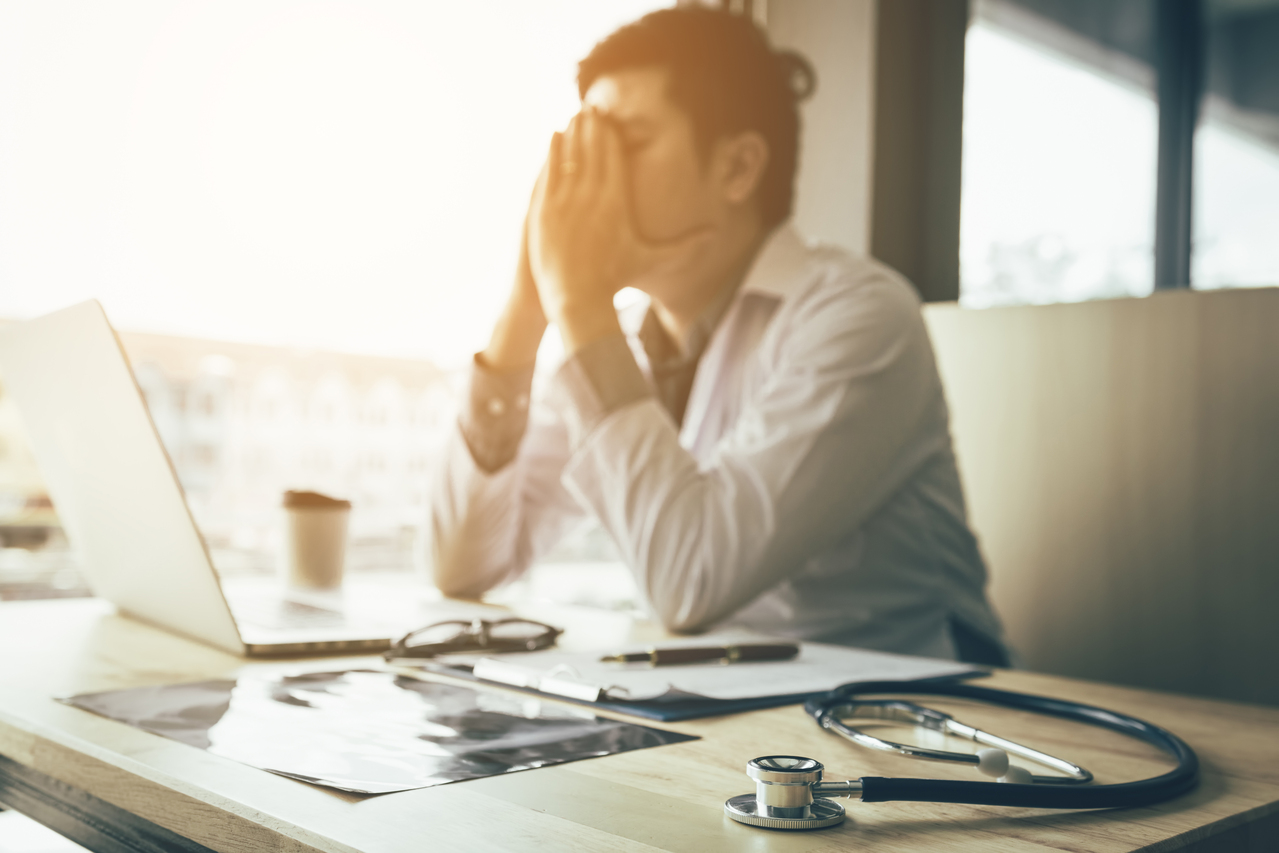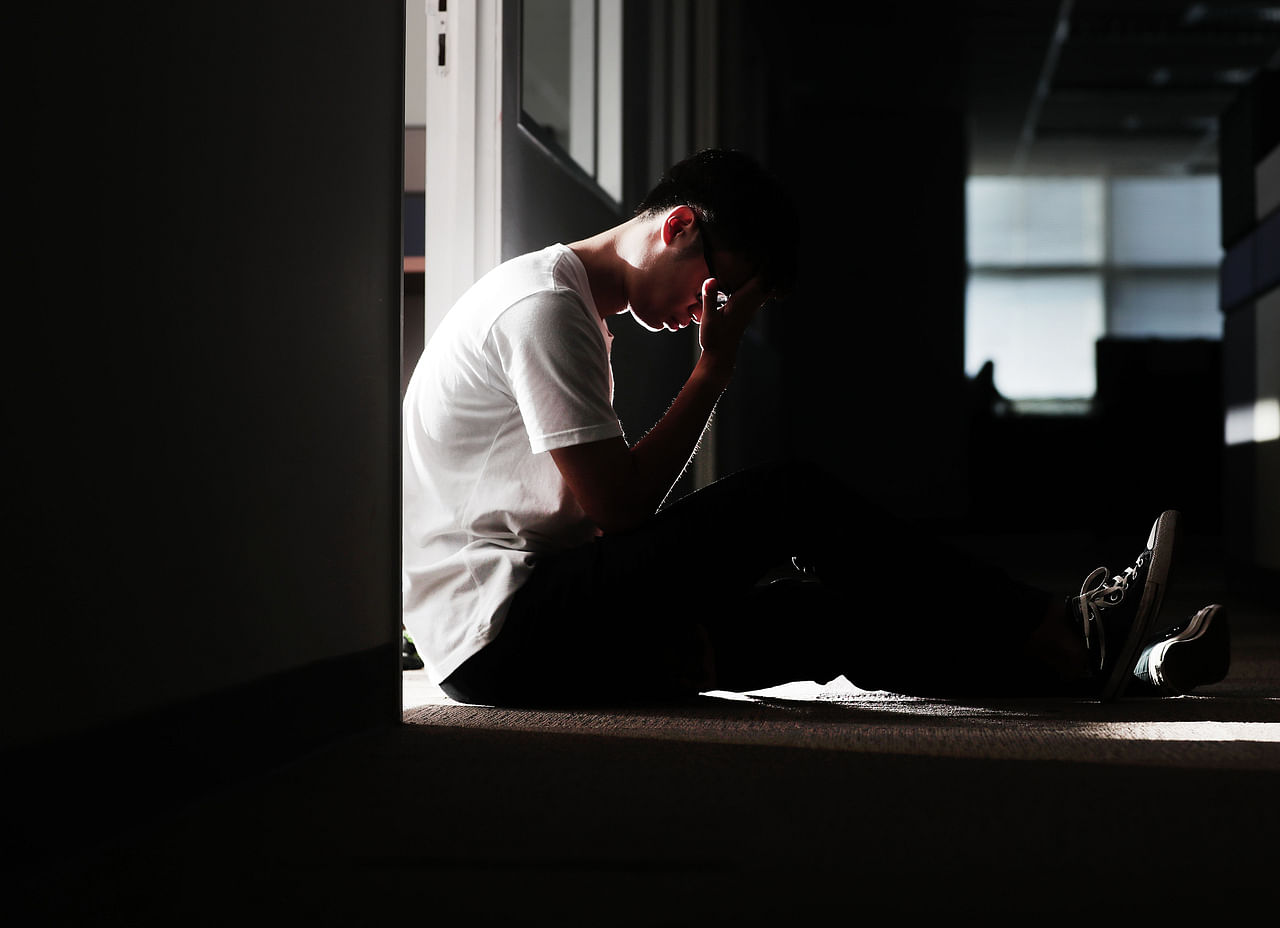More doctors in Singapore face burnout, anxiety amid the pandemic
Sign up now: Get ST's newsletters delivered to your inbox

About 81 per cent of the doctors surveyed had symptoms of stress.
PHOTO: ISTOCKPHOTO
SINGAPORE - Doctors in Singapore show signs of increased burnout and psychological distress because of the Covid-19 pandemic, according to three recently released studies of healthcare workers here.
While many healthcare workers have been similarly affected, doctors say those in their profession may be less likely to seek help for their mental health over concerns that making their struggles public will affect their licence to practise.
In Singapore, a doctor who is impaired in his or her ability to practise, due to physical or mental conditions, must notify the Singapore Medical Council (SMC), according to the council's Ethical Code and Ethical Guidelines.
In the case of impairment because of mental health conditions, the doctor must seek psychiatric intervention or treatment, and provide medical reports to certify fitness to work, the guidelines say.
In a study published last month, researchers from the Institute of Mental Health (IMH) found higher rates of anxiety, depression and burnout in primary care doctors than before the pandemic.
The study, which surveyed 257 primary care doctors working in polyclinics and private clinics, also found that doctors working in polyclinics were more likely to have symptoms of anxiety and depression than doctors working in private clinics.
Primary healthcare group Parkway Shenton, which has 54 clinics, surveyed 497 support staff and healthcare workers.
The study found that 42 per cent of the 97 doctors had symptoms of anxiety, much higher than the average national levels (1.6 to 3 per cent) before the pandemic. About 81 per cent of the doctors surveyed had symptoms of stress, according to the study shared at the 8th Asia Pacific Primary Care Research Conference last month.
A study led by National University Health System (NUHS) researchers was published in JAMDA, the journal of AMDA - The Society for Post-Acute and Long-Term Care Medicine. It surveyed 3,075 healthcare workers, including 458 doctors, who worked in public hospitals and one primary care health service involved in front-line work during the pandemic.
It found that more than 75 per cent of those surveyed were at risk of burnout and showed signs of disengagement and exhaustion.
While burnout is not classified as a mental illness under the Diagnostic And Statistical Manual Of Mental Disorders, Fifth Edition, a tool used internationally to aid diagnoses of mental illnesses, burnout should not be disregarded since it can contribute to stress, said Dr Alvin Lum, lead researcher of the IMH study of the impact of Covid-19 on primary care doctors.
If burnout is not addressed, it can affect a person's mental well-being and lead to issues that would affect their work performance and productivity, adds Dr Lum, who is head of medical care and deputy director, mental health-GP partnership programme at IMH.
The IMH study, carried out last year from April to September, found that more than 20 per cent of the primary care doctors surveyed had symptoms of anxiety and depression, while 82 per cent had symptoms of burnout. It was published in peer-reviewed international journal BJGP Open.
All were higher than the rates of anxiety, depression and burnout reported in existing literature, including studies of healthcare workers by other researchers earlier in the pandemic or during previous disease outbreaks.
The 257 doctors surveyed by IMH researchers highlighted these stressors: the change in operating guidelines for private clinics; the physical and mental strain of wearing personal protective equipment for long periods of time; an increased workload; as well as financial strain from reduced patient load in private clinics and reduced opportunities for locum work. Locum doctors stand in for regular doctors.
Doctors who spoke to The Straits Times, often on condition of anonymity, agreed on these stressors and also highlighted fear of infection, fear of infecting loved ones, and uncertainty as public health directives changed with new knowledge of the Covid-19 virus.
An opinion piece in the newsletter of the Singapore Medical Association (SMA) in May last year warned of the psychological toll of the pandemic.
The writer, SMA council member Tina Tan, warned her colleagues about the dangers of downplaying the pandemic's effect on their mental health.
Dr Tan wrote: "There is a constant upheaval, with no end in sight and no chance to catch a breath... few of us have allowed ourselves to process what has happened and allow a catharsis of our emotions - fear, anxiety, anger and stress. Practically, there is no time to; psychologically, the pressure could be building up unbeknown to us individually."
She suggested measures of support such as making "a conscientious effort to unwind", and that doctors should be aware of when they need help, then seek that help.
Dr Tan wrote: "Now is not the time to worry about your reputation or what your colleagues might think of you. If you are not coping well, seek professional help. Each institution in Singapore has peer support, and there are free psychological services for healthcare workers that we can access."
The London-based Medical Protection Society, which offers expert legal advice and other support to 5,000 healthcare professionals in Singapore, has offered a confidential counselling service to its members since last year.
A spokesman for the society says that use of the counselling service has been limited.
"However, we hope members have been utilising the support resources provided by the Singapore Psychiatric Association and Singapore Medical Association."
The two associations have disseminated information on helplines and support services for healthcare workers since July last year.
The spokesman adds: "We still feel more could be done, with a focus on providing easier access to the right kind of support, which can help medical professionals to manage specific issues discreetly and continue to perform at their best."
Are doctors reluctant to seek help for their mental health?
"The disincentive to seek support is real," Dr Tan tells ST. "The ECEG (Ethical Code and Ethical Guidelines of the SMC) obligates a fellow practitioner to report a doctor who is deemed to be unfit to practise; hence this sometimes ends up deterring a doctor from seeking the help they may need."
Indeed, a doctor in her 30s, who wanted to be known only as Dr Wang, told ST she does not know anyone who has taken up the free psychological services available to doctors, even before the pandemic. "A visit to the centre would appear in my patient record and I wouldn't want that to be brought up 10 years down the road."
More needs to be done to reduce the stigma of seeking help for mental health issues, and to not penalise doctors who do so, says Dr Wang. "These problems may not be major but, like a chronic illness, they need to be managed."
The SMC said in a statement that it is committed to protecting the health and safety of the public by ensuring that registered doctors are competent and fit to practise medicine in Singapore. "Under the Medical Registration Act, the appropriate course of action would depend on the impact of the doctor's condition on his/her ability to practise, and not the type of condition per se such as depression or burnout," the statement added.
Once a doctor declares a mental health condition to the SMC, the council requires reports from the attending psychiatrist in order to assess whether the doctor is able to continue providing safe and appropriate care for his patients.
"Doctors with mental health conditions who are completely recovered can continue to practise independently. But for doctors who are still receiving psychiatric care, the SMC will assess whether they require supporting supervision by another senior doctor or can continue to practise independently," the statement said.
Parkway Shenton medical director Dr Edwin Chng, thinks prevailing attitudes to mental health make it difficult for people to seek help and support. "There's still a huge stigma attached to mental health diseases. It's not just medical professionals ; people are worried: 'If I tell HR I have depression, I might lose my job or any opportunity for a career advancement.'
"But it's like any illness, you need to seek treatment early," he says.

<p>Posed photo/photo illustration to go with depression/stress/suicide stories.</p>
PHOTO: ST
In July last year, he surveyed employees of the primary healthcare group to determine the prevalence of mental health issues among the staff during the pandemic.
Among the doctors, anxiety was up to 42 per cent, compared with the pre-pandemic national prevalence of 1.6 to 3 per cent, while 24 per cent had symptoms of depression compared with the national prevalence of 6.3 per cent.
Prolonged stress leads to poor quality of life, increased risk of health problems and poorer work performance, says Dr Chng. Parkway Shenton has used the study to find ways of supporting its staff, such as ensuring regular staff engagement, mental health workshops and clear communication - a lack of which is a stressor.
There are several strategies to mitigate burnout, as suggested by the NUHS study published in JAMDA. It suggests that adequate training, avoiding shifts longer than eight hours and providing a safe working environment goes a long way in reducing the stressors on healthcare workers, including doctors.
Dr Maleena Suppiah Cavert, chief well-being officer, NUHS, says there are various interventions across NUHS' healthcare and academic institutions to support all staff, including doctors. There is access to art therapy, music therapy, mindfulness sessions, well-being champions in each department, as well as counselling services.
But she notes that there may be several barriers to staff using these outsourced partner counselling services. Because of demand, it can take eight to 10 weeks to see a counsellor under this scheme.
Doctors are perceived to be "invulnerable or superhuman", says Dr Cavert. Mental health issues can be taboo as there is stigma attached to it. Help-seeking behaviour may not be forthcoming for fear of being deemed incompetent, compounded with the fear of one's licence to practise being compromised, she adds.
She says it is important to find ways to normalise conversations about mental health for doctors and to come up with ways to reintegrate those who may have needed time off to recover.
"How do we ensure that doctors get the help they need? We need to educate and change people's perceptions, in tandem with providing robust support," she says.

The issue of long hours on call for junior doctors has come under scrutiny again recently.
PHOTO ILLUSTRATION: PIXABAY
What about doctors in other countries?
Doctors in Singapore may be less willing to seek help for mental health conditions for fear that their licence to practise will be compromised, say doctors and well-being practitioners here.
According to the Singapore Medical Council's Ethical Code and Ethical Guidelines, doctors have an obligation not to allow their own physical or mental impairment, or that of their colleagues, to harm or distress patients. Doctors are expected to self-report such impairments, to seek treatment and provide medical reports of their fitness to practise.
Doctors treating colleagues who are physically or mentally impaired to the extent that patients have been harmed, or are at imminent risk of being harmed, must encourage their colleagues to self- report or, failing that, report them to the relevant authorities.
What is the situation in other countries?
In Australia, the Medical Board of Australia, which registers medical practitioners and medical students and develops codes and guidelines for the medical profession, has similar mandatory reporting guidelines.
In 2017, the board recognised that these guidelines could deter doctors from seeking help for mental and physical illnesses, and emphasised that the threshold for mandatory reporting is high. A "health condition" is not the same as an "impairment". A treating doctor is obligated to make a mandatory report only if the patient-doctor "has an impairment that has placed the public at risk of substantial harm".
Under these guidelines, mandatory reporting is not required for a patient-doctor with a mental health condition that is stable. According to the board's website, this is because when "the practitioner-patient is engaged in and complying with treatment, there is no substantial risk of harm to the public".
Australia has a nationwide Doctors' Health Services programme, or "drs4drs", which offers a free, confidential and 24/7 telehealth service specifically for doctors and medical students who are struggling with their mental health.
In the United States, disability rights laws make it illegal to ask doctors questions about current or past diagnoses or treatment for mental disabilities that do not affect their current ability to function, when doctors apply for or renew their medical licences.
However, a 2017 study published in the Mayo Clinic Proceedings found that two-thirds of US states ask such questions during licensing procedures, and doctors from these states are more reluctant to seek help for mental health conditions because they fear compromising their licence to practise.
Getting help
National Care Hotline: 1800-202-6868 (8am - 12am)
Mental well-being
Fei Yue's Online Counselling Service: eC2.sg website (Mon to Fri, 10am to 12pm, 2pm to 5pm)
Institute of Mental Health's Mental Health Helpline: 6389-2222 (24 hours)
Samaritans of Singapore: 1800-221-4444 (24 hours) /1-767 (24 hours)
Singapore Association for Mental Health: 1800-283-7019 (Mon to Fri, 9am to 6pm)
Silver Ribbon Singapore: 6386-1928/6509-0271 (Mon to Fri, 9am to 6pm)
Tinkle Friend: 1800-274-4788 (Mon to Fri, 2.30pm to 5pm)/ Tinkle Friend website (Mon to Thu, 2.30pm to 7pm and Fri, 2.30pm to 5pm)
Institute of Mental Health's Mental Health Helpline: 6389-2222 (24 hours)
Samaritans of Singapore: 1800-221-4444 (24 hours) /1-767 (24 hours)
Singapore Association for Mental Health: 1800-283-7019 (Mon to Fri, 9am to 6pm)
Silver Ribbon Singapore: 6386-1928/6509-0271 (Mon to Fri, 9am to 6pm)
Tinkle Friend: 1800-274-4788 (Mon to Fri, 2.30pm to 5pm)/ Tinkle Friend website (Mon to Thu, 2.30pm to 7pm and Fri, 2.30pm to 5pm)
Counselling
TOUCHline (Counselling): 1800-377-2252 (Mon to Fri, 9am to 6pm)
Care Corner Counselling Centre (Mandarin): 1800-353-5800 (Daily, 10am to 10pm)
Care Corner Counselling Centre (Mandarin): 1800-353-5800 (Daily, 10am to 10pm)


